Want to make money writing? Good news: The content writing market in the United States alone is expected to reach a staggering $308 million by 2030. Writers earn anywhere from $30,000 to over $100,000 annually, depending on their expertise, industry, and client base.
Carol Tice, founder of Make a Living Writing, puts it simply:
"The secret to earning well as a writer is to stop writing for exposure and start writing for good money. Once I focused on finding quality clients who valued professional writing, my income soared."
Today's writing opportunities are innumerable—you can craft marketing copy, develop online courses, ghostwrite, and so much more. Whether you're a seasoned writer or just starting, there are more ways than ever to monetize your writing skills.
The best part? You can make money with a laptop!
Let's explore how you can transform your passion for writing into a profitable career.
Types of writing you can do to make money
From copywriting to blogging, or ghostwriting, there are many paths to monetize your writing. With the right approach and skills—and a little bit of luck—you can turn your passion for writing into a profitable career.
SEO Writing
When you search on Google, what makes some content appear at the top of search results? And why do other pieces fade into obscurity? That's where SEO writing comes in.
SEO writing is about creating content that rises to the top of search results by understanding exactly what your audience is looking for. The secret lies in mastering the delicate balance between what readers want and what search engines reward.
So, what is a day in the life of an SEO writer? Here’s a glimpse:
- Keyword research & analysis: Think of this as detective work - you're figuring out which words and phrases your audience types into search engines. To do this, SEO writers dig into search volumes (how many people look for these terms) and find out what competitors are ranking for. The real skill is picking keywords that give you the best shot at reaching your audience.
- Understanding search intent: When people search online, sometimes they're just looking for information (like "how to bake bread"), sometimes they want to buy something, and sometimes they compare options. As an SEO writer, your content must match whatever they're trying to accomplish.
- Content optimization: Here's where the magic happens - you'll naturally weave those keywords into your content. As an SEO writer, make sure your titles grab attention, your headers make sense, and everything flows smoothly for readers and search engines.
- Technical writing: Don't let the word "technical" scare you - this is really about making your content super easy to read. SEO writers break things up into bite-sized chunks, use plenty of headings to guide readers along, and keep everything organized. Think of it as creating a clear path for your readers to follow.
- Creating quality content: The best SEO content answers questions thoroughly, brings fresh perspectives to topics, and keeps readers coming back for more. It's about being genuinely useful, not just trying to game the system.
Want to get started in SEO writing? Explore online digital marketing courses and play around with writing tools. Most folks mix formal learning with hands-on practice.
Copywriting
Copywriting is a specialized form of persuasive writing that does one thing really well: it gets people to take action. Think signing up for a newsletter, making a purchase, or booking a consultation call. You'll find copywriting everywhere in business. Email campaigns that nurture relationships with customers, sales pages that showcase products, ebooks that serve as lead magnets, or conversion-focused landing pages. Even checkout experiences that seal the deal. Here’s what you could expect to be working on as a copywriter:
- Brand copywriting: Think of this as being the voice of a company's personality. Brand copywriters craft memorable taglines and stories that stick in your mind This includes taglines, brand stories, and company messaging that captures the essence of a brand's identity and values. Think Nike's "Just Do It" or Apple's "Think Different."
- Direct response copywriting: This is where the rubber meets the road in terms of getting people to take action. These writers are like skilled salespeople who work through words, and make you think "I need this in my life right now!" Think sales letters, email campaigns, and landing pages that convert prospects into customers through persuasive language and calls to action.
- Technical copywriting: Involves translating complex technical information into clear, accessible content. Common in B2B markets, software documentation, user manuals, and product specifications where accuracy and clarity are paramount.
- Social media copywriting: These writers master short-form messages, adapting their voice across different platforms. They know exactly how to grab your attention, whether you're scrolling through Instagram or scanning LinkedIn.
Thinking of becoming a copywriter? You don’t necessarily need formal education. However, it helps to learn key marketing fundamentals and stay curious about human behavior. Copywriting is powerful because it leverages principles of psychology to hook the reader.
Consider Volkswagen's "Think Small" campaign, for instance. The revolutionary 1960s campaign turned the Beetle's small size from a weakness into a strength. At a time when cars were all about being big and flashy, and the zeitgeist was “bigger is better,” the brand turned this on its head.
Instead of hiding the Beetle's small size, they made it the star with copywriting that was honest and witty, not salesy. Small meant economical (good gas mileage), easier parking, affordability, and reliability (fewer parts to break).

Social media writing
Ever wonder why some social media posts just grab you? It's no accident. There's actually a science to creating content that spreads like wildfire.
Think of it this way - you're mindlessly scrolling through your feed when something makes you stop. That's exactly what great social media writers do. They craft those perfect scroll-stopping moments.
Here’s what a social media writer does:
- Social storytelling: Writers must excel at crafting hooks, developing relatable scenarios, and telling brand stories that resonate emotionally with followers in just a few sentences. Think of yourself as the friend who always knows how to make a story interesting. It's about finding those little moments that make people stop scrolling and think, "Hey, this speaks to me!"
- Community management: Beyond creating content, writers need skills in fostering community dialogue, responding to comments, and managing conversations. This includes mastering the art of diplomatic responses, handling criticism, and encouraging positive interactions.
- Creative testing and optimization: Social media writers must be data-literate, so they can use metrics to refine their approach. This involves analyzing engagement patterns, A/B testing different writing styles, and adjusting content based on performance insights.
Are you an aspiring social media writer? Build expertise through digital marketing bootcamps, certification programs, and writing workshops. Practical experience through internships or managing personal accounts, combined with mentorship from experienced professionals, can help you create a well-rounded skill set.
Social media success isn't random. It's built on proven frameworks that turn casual readers into engaged followers. The best writers know exactly which buttons to push.
Wendy's Twitter Roasts is the perfect example of pushing the right buttons. They responded to a user who asked, "What's better than McDonald's?" with "A McRefund." The simple response earned thousands of engagements by being unexpectedly savage for a brand. Why did it work? The brand was simply playing to the gallery on a platform that’s known for all-around rage-tweeting and savagery.
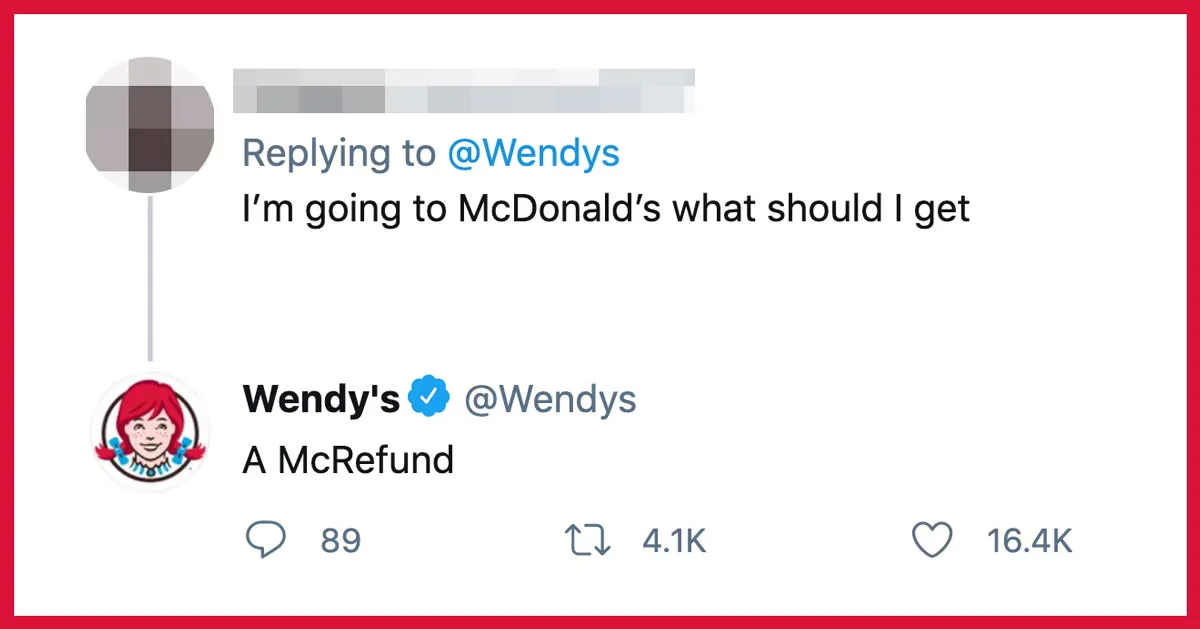
The best part about being a social media writer? It isn't just about creating popular posts. You can help clients build devoted followings. And let's be honest – in a world where everyone dreams of being the next big thing, there's no shortage of people who need your skills.
Want to see this in action? Drop a fascinating fact into your next post. Follow it with a story that makes it personal. Then wrap it up by asking your audience to share their take. Watch what happens.
Ghostwriting
Ghostwriting is the ultimate backstage pass to content creation. It's where talented writers step into someone else's shoes to capture their voice, ideas, and stories - but without taking any of the spotlight. Like a ventriloquist of words, if you will.
Who needs ghostwriters? More people than you'd think. Business leaders too busy running empires to write their memoirs. Celebrities with stories to tell but not enough time (or writing skills) to tell them. Politicians who need speeches that resonate. Even your favorite musicians might be singing words penned by someone else. Here’s a peek into the world of ghostwriting:
- Research and building subject expertise: Ghostwriters must become well-versed in their clients' fields, whether they write about business, technology, or personal memoirs. They conduct thorough research to ensure content accuracy and authenticity while integrating the clients' experiences and knowledge.
- Confidentiality & professional ethics: There's an unspoken code of trust in ghostwriting. You're often privy to personal stories, business secrets, or innovative ideas, and keeping those confidential is absolutely essential. ghostwriters often sign NDAs and must respect the agreement that the final work will be published under the client's name.
- Relationship building: The heart of ghostwriting is really about relationship building. You'll spend lots of time talking with your clients, asking questions, and understanding their thoughts. It's almost like being a journalist and a therapist rolled into one – you need to know what questions to ask and how to really listen.
Tech ghostwriter Dipesh M shares some ghostwriting tips: actively listen to what founders are saying, do interviews, and record 1:1 calls to catch their speaking voices. 50% of ghostwriting is about doing deep into industry research, he adds.
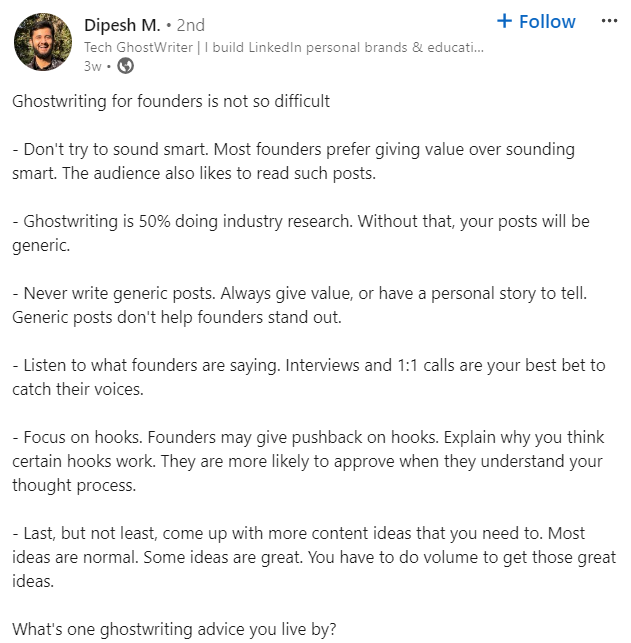
Build expertise in your preferred niches (memoirs, business, etc.) and start small with content writing or blog posts to gain experience. Network on LinkedIn and create writing samples, even if unpublished, when you’re just starting out.
How much do writers get paid?
Let's talk about what writers actually earn. It's a question that comes up a lot, and the answer is pretty fascinating.
Like any skilled profession, your earning potential grows with your toolkit. The most successful writers have usually been in the game for five or more years and can point to a track record of solid work. When you bring experience, a portfolio of published pieces, and some glowing testimonials, you can often charge two or three times what a beginner might.
What’s really interesting is how much rates can vary across different types of writing.
A blog post might bring in anywhere from $50 to over $500, while someone ghostwriting an entire book could earn $15,000 to $50,000 or more.
Technical writers, who often work on complex product documentation, tend to do particularly well, charging $60-120 per hour.
White papers - those in-depth research pieces companies use - can command $1,000 to $7,000 each.
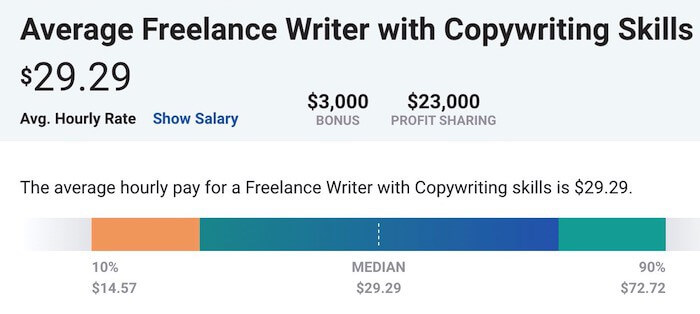
Want to know where the real money is?
Technical documentation, especially in fields like healthcare and finance, tends to pay very well.
Medical writing, financial services content, and anything involving legal expertise are also top earners.
More recently, cryptocurrency and blockchain content has joined these ranks.
Here's a pro tip: many of the most successful writers I've observed don't just stick to one lane. They might combine client work with creating courses or offering consulting services. And if you're looking to maximize your earnings, focusing on those high-paying niches while building your portfolio is a smart move. Just remember to raise your rates as your expertise grows - your knowledge becomes more valuable with every project.
How to find work as a writer
Finding work and making money as a professional writer requires strategy and persistence. Here’s a quick guide to help you get started.
Identify your writing niche
Think about what gets you excited to write. Do you love breaking down complex tech concepts? Does writing persuasive business copy make you tick?
Your niche might naturally emerge from your background – if you've worked in healthcare or finance, you've got valuable insider knowledge that clients need. Traveled across Asia? You could be a travel ebook writer.
Or perhaps you've discovered you have a knack for a particular writing style, whether it's investigative journalism or technical documentation. Also, think about the content types that come most naturally to you, and who you want to write for to zone in on your writing niche.
Create a portfolio
Think of your portfolio as your writing showcase – it's where you get to put your best work forward. Many writers start by launching a blog on Medium. Not only does this give you a platform to show off your writing skills, but you might also catch the eye of potential clients.

When it comes to portfolio platforms, Behance is a good choice to showcase copywriting or creative work, while Muckrack is where journalists and PR pros typically show their work.
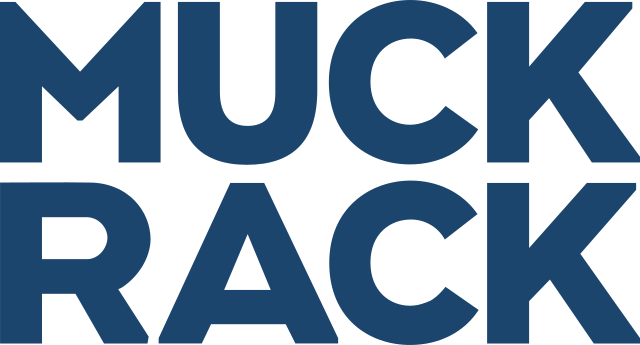
With tools like Wordpress or Wix, it’s now super easy to build your own custom website, which you can design just the way you want.
Don't forget to include different types of writing to show your range, and if you can, share the results your writing has achieved for previous clients – nothing speaks louder than success stories.
Network strategically
Here's a writing career secret: your next great opportunity probably isn't on a job board.
Writing communities, both online and in person, can open doors you didn't even know existed. LinkedIn is a goldmine for connecting with professionals in your field, and you'd be surprised how many opportunities pop up in Telegram channels.
Get out there and attend industry events when you can – writing conferences, seminars, awards shows. These aren't just events; they're chances to meet people who might need your services. Once you've built up some experience, consider speaking at these events. It's a fantastic way to position yourself as an expert in your field.
Follow industry blogs and news
Keeping up with industry trends doesn't have to feel like homework. Sign up for newsletters and publications that cover your areas of interest – ones that share both job opportunities and interesting insights about the writing world.
Chris Bibey’s Freelance Framework gives you a quick look-see of weekly opportunities in copywriting, journalism and more. Newsletters like Mindstream are great for catching up on AI developments and tools that could make your work easier.

When you see changes happening in your industry, think about how they might create new opportunities for content creation.
Scan the web for job postings
Freelance platforms like Upwork and Fiverr can be great starting points – they're especially useful when you're building your portfolio. Professional job boards like MediaBistro often list high-quality opportunities. Content agencies can become reliable sources of steady work once you build a relationship with them.

Don't overlook local businesses – sometimes the best opportunities are right in your neighborhood. And, with remote work becoming increasingly common, your potential client base is global.
Remember, building a writing career is more of a marathon than a sprint. Take time to customize your approach for different opportunities, and don't get discouraged if success doesn't come overnight. Keep refining your craft, building relationships, and putting yourself out there.
Writing tools to help you work smarter, not harder
Writing isn't always easy. That’s where writing tools are changing the game. Whether you're working on a blog post, a business report, or your next novel, these tools can help you level up your writing game.
Grammarly
Grammarly started as a way to help people learn English but quickly became everyone's go-to writing companion. What makes it special? It doesn't just catch those pesky typos; it actually understands what you're trying to say and helps you say it better.

Hemingway
If Grammarly is your friendly English teacher, Hemingway is your no-nonsense writing coach. This tool cuts straight to the chase. It'll tell you when you're rambling or your sentences get too tangled. You know those sentences that make you run out of breath just reading them? Hemingway helps you break those down into something more digestible. Writers love it because it's like having a second pair of eyes that's laser-focused on making your writing punchy and powerful.
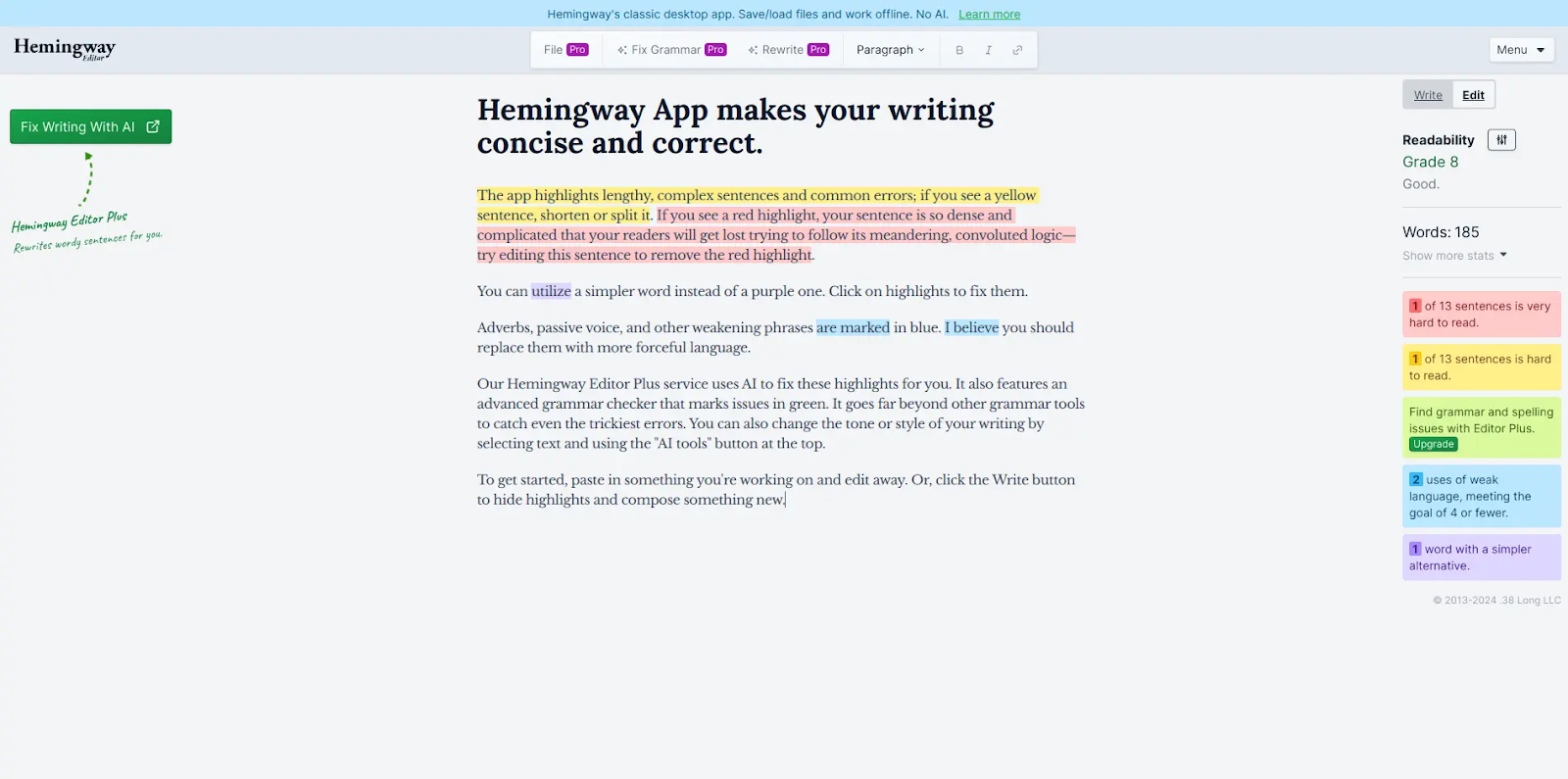
AI tools
AI writing tools are like having a brainstorming partner who's available 24/7. They're fantastic at helping you get past writer's block or organizing your thoughts quickly. But–and this is important–they're not magic wands.

If you let AI do all the work, your writing will sound like “slop.” Slop is a new-age term for low-quality, obviously AI-generated content. ChatGPT is the mass-favorite AI writing tool. However, some reviews say Claude is better because of its more conversational writing style. Copy.ai shines for snappy marketing copy, and a premium subscription gives you access to a range of ready prompts for social media, sales ads, and more.
Check out the best AI writing tools.
How to raise your writing rates
You’ve started to make money as a writer. Now, how do you raise your rates? And, why is it that the very thought of raising writing rates makes so many writers break a sweat?
It doesn’t have to be so daunting.
Think of it like building a case for your value. First, gather evidence of your impact. What results have your words delivered? Maybe your blog posts consistently drive traffic, your emails get stellar open rates. When you're ready to have that rate conversation, these success stories become powerful tools.
Here's a strategy that works well: start fresh with new clients at your desired higher rate. It's often smoother than adjusting existing relationships, though we'll get to that too. When you quote your new rate, remember - you're a professional offering expertise, not just words on a page.
When it's time to raise rates with current clients, give them plenty of notice and frame it professionally. Something like: "I wanted to let you know that starting [date], I'll be updating my rates to better reflect my growing expertise and the value I've been bringing to projects. I've really enjoyed working with you over these past [months/years], and I wanted to give you plenty of advance notice."
When should you raise rates? Annually, at minimum. This helps keep pace with inflation and market changes. You could also consider raising your rate when you've gained significant new skills or certifications.
For annual increases, 5-10% is generally reasonable and expected. If you’re an in-demand specialist with a unique expertise to offer, you can go up to 30-50%.
One often-overlooked path? Connect with people in higher-paying markets. Professional associations and industry events can lead to clients with bigger budgets who value quality writing.
Remember - this isn't about defending your worth. It's about showing clients the genuine value you bring to their business. When you consistently deliver excellent work, you'd be surprised how many clients will stick with you through reasonable rate increases.
Ready to start making money as a writer?
Freelance writer Jennifer Goforth Gregory notes in her blog,
"The biggest mistake I see new freelance writers make is waiting for clients to come to them. Success in this field requires proactive marketing and consistent outreach. I made my first six figures when I finally started treating freelancing like a real business instead of a hobby."
The key is to treat your writing as a business without losing sight of your creative passion. Remember that every successful writer started exactly where you are. Your writing skills can pay the bills. It just takes dedication, a solid game plan, and a willingness to keep growing as a writer.
If you want to learn how to take your writing from casual hobby to a successful business venture, check out writing communities and courses on Whop. Communities like CopyMBA come with a network of copywriters, one-on-one mentorship, job board, copywriting 101 and a freelance masterclass. Meanwhile, SEO Boardroom offers community access, networking opportunities, an SEO toolbox, multiple SEO courses, and more. I even have my own community that comes with a forum, writing templates, member-only trainings and giveaways.
Or, get started making money from writing by creating a whop of your own. With your whop you can offer courses, community access, templates, video calls, and more.




